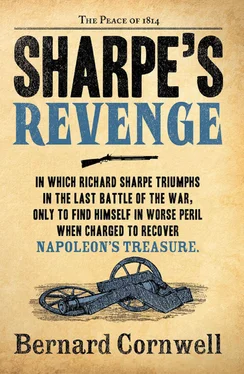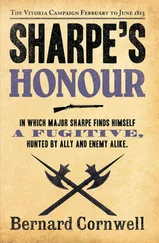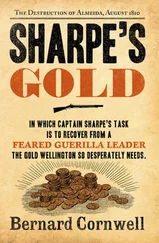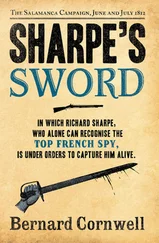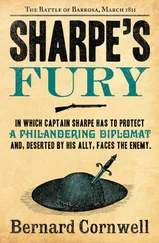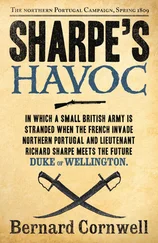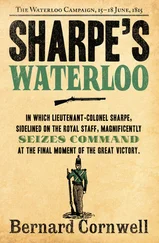‘They’re just no damned good, sir.’ The head drover, a Yorkshireman, stared gloomily at the beasts which had been driven into a pasture behind the headquarters. These animals had been sent as the brigade’s walking larder which the Yorkshireman was supposed to herd forward as the army advanced. ‘It’s the wet that’s done it, sir.’
‘They look plump,’ Sharpe said, hoping that optimism would drive the problem away.
‘They’re fleshy, right enough,’ the Yorkshireman allowed, ‘but you should see their hooves, sir. It’s fair cruel to do that to a beast.’
Sharpe stooped by the nearest cow and saw how the hoof had separated from the pelt. The gap was filled with a milky, frothy ooze.
‘Once they start seeping like that,’ the drover said grimly, ‘then you’ve lost the beasts. They’ve walked their last mile, sir, and I can’t understand the nature of a man who’d do this to a creature. You can’t walk cattle like men, sir, they have to rest.’ The Yorkshireman was bitter and resentful.
Two hundred cattle stared reproachfully as Sharpe straightened up. ‘Are they all like it?’
‘All but a handful, sir, and it’ll mean a killing. Nothing else will serve.’
So butchers had to be fetched, ammunition authorised, and barrels and salt found for the meat. All afternoon the sound of bellowing and musket shots, mingling with the stench of blood and powder smoke, filled headquarters. The sounds and smells at least served to drive away the two Spaniards who otherwise seemed intent on draining away Nairn’s precious hoard of captured brandy. An aide arrived from Division demanding to know what the firing was, and Sharpe sent the man back with a curt complaint about the quality of the cattle. The complaint, he knew, would be ignored.
At the day’s end, and despite its unrelenting activity, Sharpe felt that most of his work was still unfinished. He said as much to Nairn when they met before supper in the farm’s parlour. The Scotsman, as ever, was ebullient. ‘Four brace of duck! Almost as satisfying as a good battle.’
‘I’ve got enough work without fighting battles,’ Sharpe grumbled.
‘There speaks the true staff officer.’ Nairn stretched out his legs so his servant could tug off his muddied boots. ‘Any important news?’ he asked Sharpe.
Sharpe decided not to worry Nairn with the problem of the cattle. ‘The only remarkable aspect of today, sir, is that Colonel Taplow didn’t make any trouble.’
Lieutenant Colonel Taplow commanded one of Nairn’s two English battalions. He was a short and choleric man with a manner of astonishing incivility who perceived slights to his dignity in every order. Nairn rather liked the foul man. ‘Taplow’s easy enough to understand. Think of him as typically English; stubborn, stupid, and solid. Like a lump of undercooked pork.’
‘Or salt beef,’ Sharpe would not rise to the Scotsman’s bait, ‘and I hope you like salt beef, sir, because you’re going to get a damned lot of it.’
Next day the advance continued. Every village greeted the British with a sullen curiosity that later turned to astonished approval when the villagers discovered that, unlike their own armies, this one paid for the food they took from barns and storehouses. Soldiers found French girls who then joined the Spanish and Portuguese wives who straggled behind the advancing battalions. The women were more trouble than the soldiers, for many of the Spanish wives had an ineradicable hatred of the French that could lead to quick savage knife fights. Sharpe once had to kick two women apart, then, when the Spanish girl turned from her French enemy and tried to stab Sharpe, he stunned her with his rifle butt before spurring his horse onwards.
Sergeant Harper, before leaving St Jean de Luz, had sent his own Spanish wife home. She and the baby had gone to Pasajes, just across the French border, with orders to wait there for Harper. ‘She’ll do just fine, sir,’ Harper said to Sharpe. ‘She’s happier with her own people, so she is.’
‘You don’t worry about her?’
Harper was astonished at the question. ‘Why should I? I gave the lass money, so I did. She knows I’ll fetch her and the child when it’s time.’
Harper might not have worried about his Isabella, but Sharpe found Jane’s absence hard to bear. He persuaded himself that it was unreasonable to expect any letters to have yet reached him from Britain, but he still eagerly searched each new bag of mail that came to the brigade. At other times he tried to imagine where Jane was and what she did. He constructed a dream in his head of the house she would buy; a gracious stone house set in a placid gentle countryside. There would be a place in the house where he could hang up his ugly heavy sword, and another place for his battered rifle. He imagined friends visiting, and long conversations by candlelight in which they would remember these lengthening spring days as they pursued an army across its homeland. He imagined a nursery where his children would grow up far from the stink of powder smoke.
They were a soldier’s dreams of peace, and peace was in the air like the smell of almond blossom. Each day brought a new rumour of the war’s ending; Napoleon was confidently said to have taken poison, then a contrary rumour claimed that the Emperor had broken a Russian army north of Paris, but the very next day a Spanish Colonel swore on the six bleeding wounds of Christ that the Prussians had trounced Bonaparte and fed his body to their hunting dogs. An Italian deserter from Marshal Soult’s army reported that the Emperor had fled to the United States, while the chaplain of Colonel Taplow’s fusiliers was entirely certain that Napoleon was negotiating a personal peace with Britain’s Prince Regent; the chaplain had heard as much from his wife whose brother was a dancing-master to a discarded mistress of the Prince.
Fed by such rumours the talk of the army turned more and more to the mysterious condition of peacetime. Except for a few months in 1803, most men had never known Britain and France to be at peace. These men were soldiers, their trade was to kill Frenchmen, and peace was as much a threat as a promise. The threats of peace were very real, unemployment and poverty, while the promises of peace were more tenuous and, for most men in the army, nonexistent. An officer could resign his commission, take his half pay, and chance his arm at civilian life, but most of the soldiers had enlisted for life, and peace for them would simply mean their dispersal to garrisons across the world. A few would be discharged, but without pension and with a bleak future in a world where other men had learned useful skills.
‘You’ll get me papers?’ Harper nevertheless asked Sharpe one night.
‘I’ll get you papers, Patrick, I promise.’ The ‘papers’ were the certificate of discharge that would guarantee that Sergeant Patrick Harper had been retired because of wounds. ‘What will you do then?’ Sharpe asked.
Harper had no doubts. ‘Fetch the wife, sir, then go home.’
‘To Donegal?’
‘Where else?’
Sharpe was thinking that Donegal was a long way from Dorset. ‘We’ll miss our friends,’ he said instead.
‘That’s the truth, sir.’
Sharpe was visiting Captain William Frederickson’s company that had taken over a windmill on a shallow hill above a wide, tree-bordered stream. The Riflemen’s supper was roast pork, a dish that Captain Frederickson was very partial to and which meant that no sow or piglet was safe if it was close to his line of march. Sharpe was given a generous helping of the stolen meat, after which Frederickson led him up the dizzying cradle of ladders which climbed to the mill’s cap. There Frederickson opened a small door and the two officers crawled out on to a tiny platform that gave access to the mill’s big axle. A spitting rain was being gusted by an east wind. ‘There,’ Frederickson pointed eastwards.
Читать дальше
